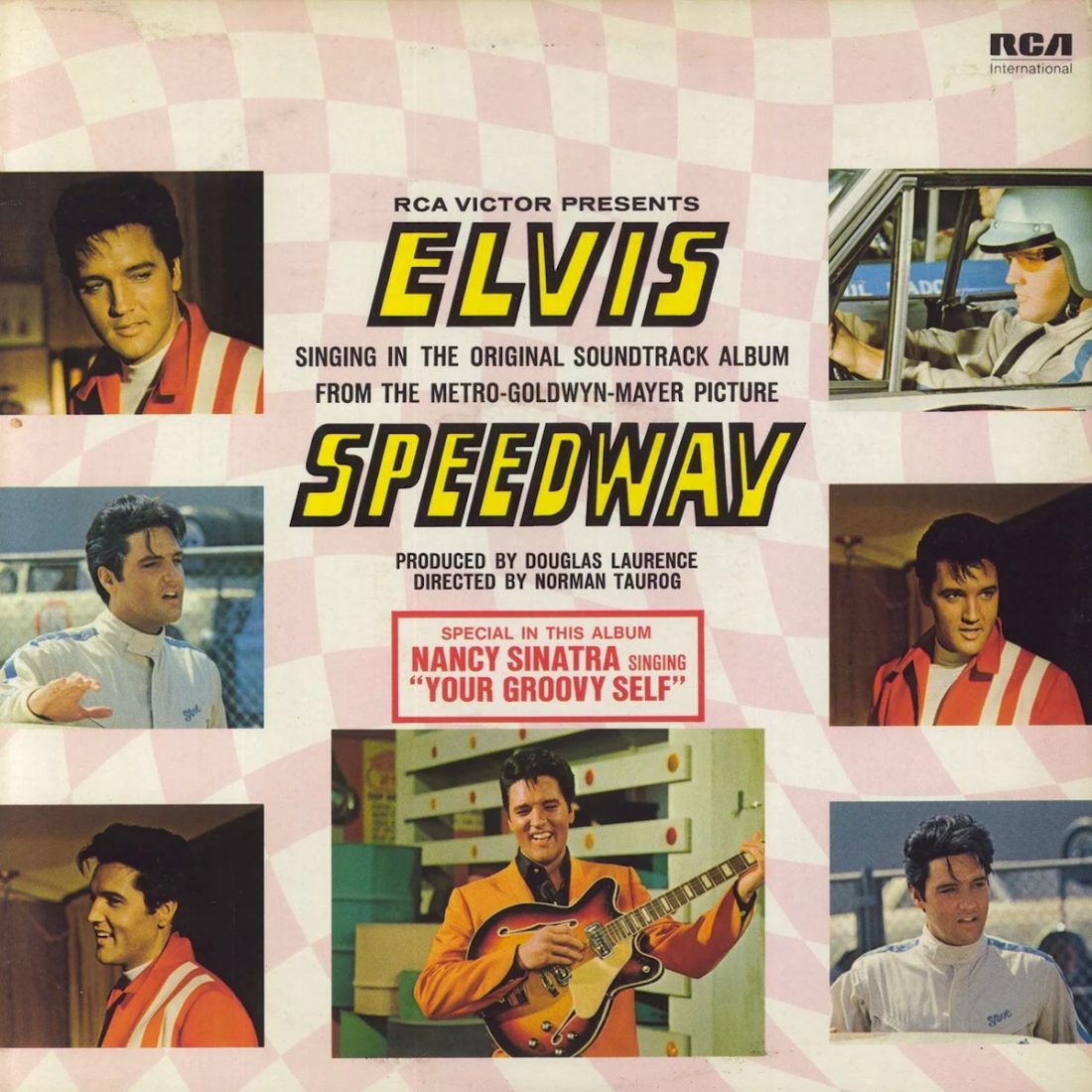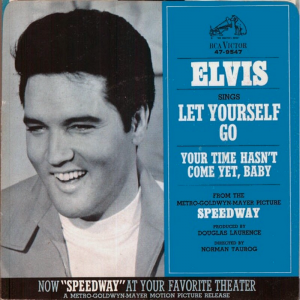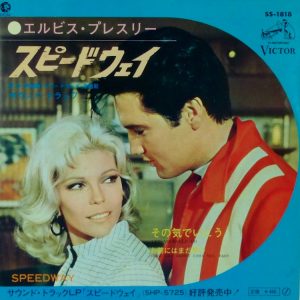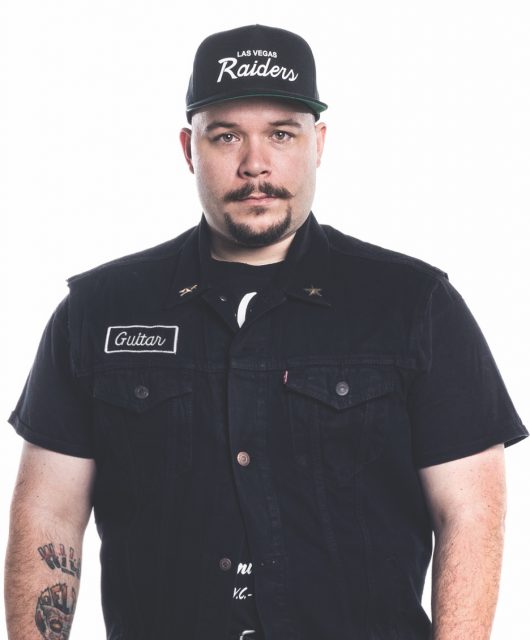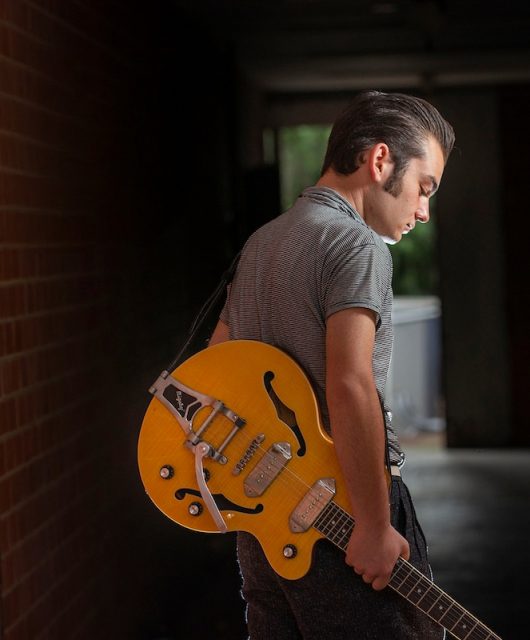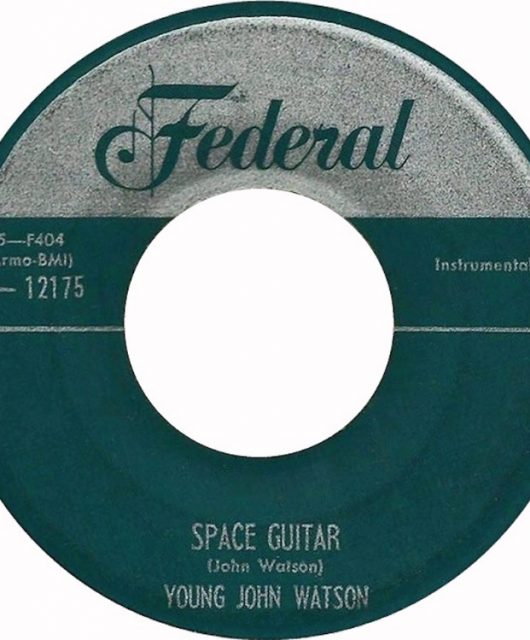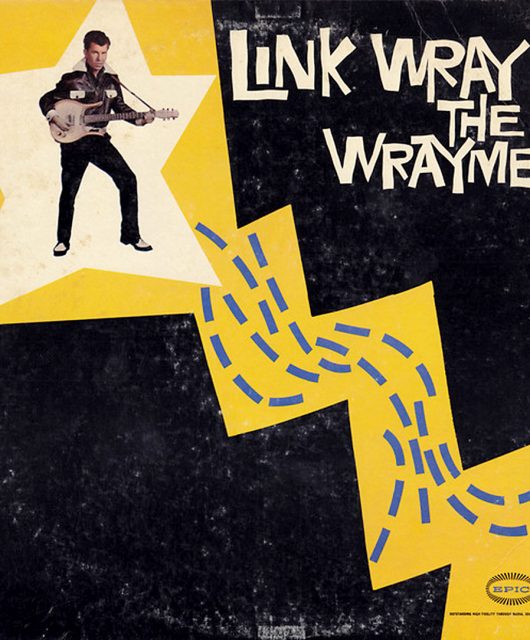Despite Nancy Sinatra’s involvement, Elvis Presley’s Speedway soundtrack would become one of the King’s lowest-selling records.
By the middle of the 60s, Elvis’ soundtrack album sales were plunging, so much so that even the Colonel, who normally stayed out of artistic matters, was concerning himself over the quality of the music.
Part of the problem was that, with Elvis a less bankable star, writing songs for his movies was no longer as rewarding. Elvis was no longer as hip with the kids as he once was, and his movies traded in good, clean, knockabout fun. They were colourful and likeable, but unchallenging, and Freddy Bienstock, in charge of sourcing new material for Elvis to record since the late 1950s, was struggling to find songs that the singer himself wouldn’t send back as unacceptable. By the time of Speedway, Elvis’ tenth film for MGM, they really were running out of track, even if the artist himself was showing a renewed interest in singing and recording.
Speedway, the last of the formulaic ‘fun for all the family’ Elvis films, actually did better at the box office than his previous nine films, and finished at No.40 in the list of top-grossing movies for 1968. The movie was as bright and engaging as its predecessors, but the soundtrack LP fared badly, selling less than 100,000 copies. It hobbled up to No.82 in the Billboard album charts in the summer of 1968, suggesting that, as Ernst Jorgensen put it in his book, Elvis Presley A Life In Music: The Complete Recording Sessions, “by the summer of 1968, Elvis Presley was left with practically no recording career.”
Hollywood Hell
Paul Lichter in The Boy Who Dared To Rock: The Definitive Elvis suggests Speedway could easily have been called ‘Viva Las Vegas, Part Two’. You could only wish. That film, well above par for the Presley franchise, had paired its star with Ann-Margret and their chemistry had been palpably obvious. Well-choreographed dance routines were backed up by decent songs, although there never was a soundtrack album attached to it.
For Speedway, Presley’s love interest was Nancy Sinatra which, at first glance, was quite a coup, even though she was apparently second choice after the more accomplished singer-actress Petula Clark had turned down the part, preferring to appear in Finian’s Rainbow with Fred Astaire. But Sinatra was on a pop career high at that time, having enjoyed success with feisty numbers like These Boots Are Made For Walkin’ and How Does That Grab You Darlin’?. Promisingly, she had harmonised with her father Frank on Somethin’ Stupid, top of the charts around the time she signed up for Speedway. By the time of the film’s release her profile would be even higher, having just sung the theme tune to the new Bond movie You Only Live Twice.
Running Out Of Gas
Sinatra also had acting experience, including in biker movie The Wild Angels (1966) with Peter Fonda and Bruce Dern, giving her kudos with a younger audience. She satisfied the taste of the times with non-classical looks, but she was no Ann-Margret, and neither was her presence much felt on the album. Although, like a few of the other tracks, it’s a song that makes more sense seen in the context of watching the movie, There Ain’t Nothing Like A Song barely qualified for the description of a duet, with Sinatra’s vocals overdubbed after completion of the sessions.
But she did have the distinction of becoming the first artist to have their own solo number on a Presley album. That song, Your Groovy Self, certainly suited her kooky style and slightly pinched range, written for her by partner Lee Hazlewood, writer/producer of These Boots Are Made For Walkin’. It can also be noted that Presley and Sinatra had a friendly, flirtatious relationship on set, surely a help to Elvis, practically going out of his mind making movies saddled with tired scenarios and uninspiring songs.
Let Yourself Go
Recordings for the majority of tracks took place ate MGM studios, Culver City, in June 1967, a set-up Elvis despised.
To be fair, he was backed by some decent recruits from Nashville, including steel guitar great Pete Drake, guitarists Chip Young and Harold Bradley, saxophonist Boots Randolph, Bob Moore on string and electric bass, Charlie McCoy on various instruments, and old faithfuls, DJ Fontana and The Jordanaires.
Only two songs were released in the single format. Let Yourself Go was a soulful stomper with a big production and a vaguely psychedelic guitar well buried in the mix. It was the backdrop to one of the best dance sequences, staged early the movie. One of three songs written by Joy Byers on the album, it went on the flipside of the pleasantly forgettable Your Time Hasn’t Come Yet, Baby, the two songs making No.72 and No.71 on the Billboard Hot 100 respectively.
Who Are You? (Who Am I?) was a sweet little tune with a cha-cha-cha rhythm and Boots Randolph embellishing the gentle mood on sax. But there was only one song Presley was personally drawn to. That was Suppose, a rather depressing ballad which he’d done as a home recording the previous year with Charlie Hodge, his musical mentor and friend, playing piano. Hodge also played piano when Presley returned to the song, now with some subtly fuller backing, including from The Jordanaires.
It was actually cut from the film, but was included as a bonus track on the album. Mine was another lachrymose ballad that promised to build but ultimately cheated the listener of the cheap thrill of a tacky big finish.
Poised For A Renaissance
Doggedly mediocre were Five Sleepy Heads and Western Union. Bad beyond words was He’s Your Uncle Not Your Dad, a cert for the shortlist of Worst Presley Song Of All Time. The title track was a generic scene-setting opener, though the album cut is more rocking than the brassier version heard over the credits.
Arguably, the best song here was Goin’ Home, delivered in the folk country style popular in the mid-60s. Albeit with a slightly cliché-ridden Joy Byers lyric, it was actually recorded in Nashville in early 1968 with Jerry Reed on guitar, at the same session on which Elvis recorded the latter’s U.S. Male. At this point, Elvis was on the doorstep of a renaissance, but for all that his singing was never less than fine, you wouldn’t have guessed it from Speedway.
For all things Elvis click here
Read More: Elvis Presley – The ’68 Comeback Special

